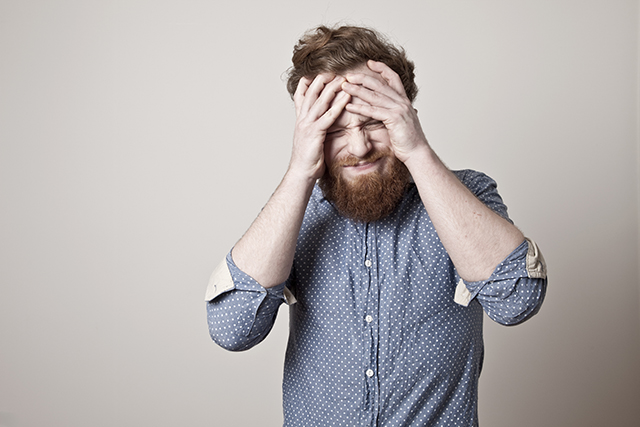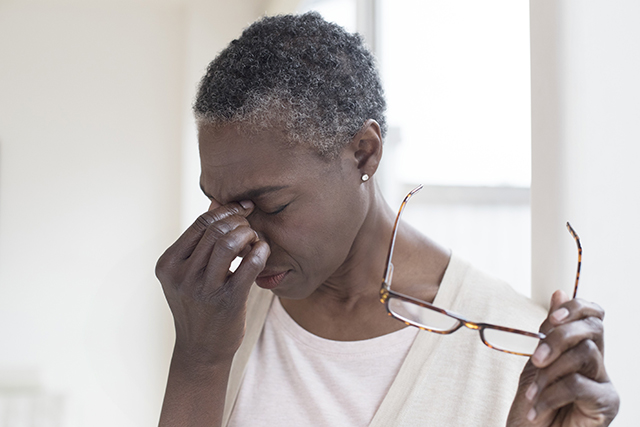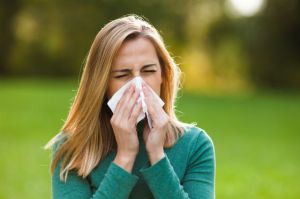Stress is the body’s natural response to life’s changes and challenges. From everyday stressors like money, school and work to more situational strains like family drama, postponed plans and global events, stress affects everyone.
Stress signals the body to release hormones that help with your “fight-or-flight” response. While some stress can keep you motivated or help you react in crisis situations, unchecked long-term, or chronic, stress can harm your health over time.
Stress can manifest in mental and physical ways, influencing your behavior, your mood and your body. Discover how stress impacts your health and methods for coping with it.
Physical Effects
How does stress affect health? It’s not uncommon to feel it, and sometimes you can see it as well.
Stress impacts the body in internal and external ways, affecting everything from the heart and digestive track to the condition of hair, skin and nails.
It raises a person’s heart rate and blood pressure. “Repeated episodes of acute stress can cause inflammation in the coronary arteries, thought to lead to heart attack,” according to the American Institute of Stress.
Stress can also cause gastrointestinal problems, like heartburn, nausea and stomach pain. Prolonged and/or intense stress can cause more severe symptoms, like vomiting, constipation and diarrhea.
In addition, stress often manifests as muscle tension in the back, jaw and neck, which can lead to other issues. “The contraction of muscles for extended periods can trigger tension headaches, migraines and various musculoskeletal conditions,” according to AIS.
Another serious repercussion of stress is a weakened immune system. “People under chronic stress are more susceptible to viral illnesses like the flu and the common cold, as well as other infections,” according to AIS. “Stress can also increase the time it takes you to recover from an illness or injury.
Finally, stress can even affect your appearance. Hormonal changes brought on by stress can lead to dry/itchy skin, hives, rashes and acne (even in adults). Stress – specifically the cortisol release it triggers – can affect biotin levels, leading to hair loss and weakened nails.
Mental and Emotional Effects
Although feeling stressed is a mood in itself, stress can also cause other mental and emotional symptoms.
Some effects are relatively minor but can impede daily life, like forgetfulness, restlessness, irritability/anger, lack of focus or motivation and feeling overwhelmed. Stress can also lead to more extreme conditions like anxiety and depression.
Another common symptom is fatigue, which can also be accompanied by insomnia, or the inability to sleep. While many Americans say they don’t get enough sleep, nearly half (46%) of Americans say they’ve laid awake at night due to their stress levels.

Behavioral Effects
Feeling stressed affects human behavior in more ways than one because everyone reacts to stress differently.
Stress can cause some people to withdraw socially, inadvertently leaving more time to stress due to fewer distractions. Clenching and/or grinding teeth is common, especially during sleep, which can cause headaches and jaw pain later. Nightmares are also common.
Struggling with long-term stress can lead to impulsive behaviors, like over- and under-eating. Overeating causes weight gain and sluggishness while under-eating can cause dehydration and low blood sugar as well as feeling lightheaded and tired.
Nervous habits like excessive fidgeting and frequent crying spells are warning signs you could be overstressed. Prolonged stress can lead to more dangerous habits, like compulsive online shopping and dependence on alcohol, drugs and tobacco.
Ways to Combat Stress
While you may not be able to avoid every stressor, there are certain things you can do to cope with stress. The first step is knowing your triggers and figuring out what type of activities best combat your stress.
Calming Techniques
Some people respond well to soothing activities. Relaxation techniques like meditation, deep breathing exercises and listening to calming music or podcasts are popular.
Spending time in nature is another great way to deal with stress. Bird-watching, gardening and going for nature walks work well for people looking to feel more in touch with the natural world.
Finally, take time for yourself. Do something to calm your mind and body, like napping, taking a bath or drinking some soothing tea. Similarly, try doing something you enjoy. Hobbies like baking and cooking, crafting, reading, doing puzzles and playing video games can help distract you from stress.
Active Techniques
Other people combat stress through physical exertion. Working out is one popular method. While regular exercise is good for physical health, it can improve your mood as well.
“Scientists have found that regular participation in aerobic exercise has been shown to decrease overall levels of tension, elevate and stabilize mood, improve sleep and improve self-esteem,” according to the Anxiety & Depression Association of America (ADAA). “Even five minutes of aerobic exercise can stimulate anti-anxiety effects.”
Cleaning is another way people deal with stress. The act of cleaning and organizing can relieve stress by giving you a sense of control. Afterward, a clean, decluttered space will give you a sense of calm – and accomplishment.
AAA members can also take advantage of the Active&Fit Direct program, which offers digital workouts in categories like cardio, strength, dance, martial arts, mind/body, high intensity interval training and cycling. There are over 2,500 workout videos to choose from! Try out a bunch of different exercise regimens and see which ones you like best. And if you want to hit the gym when they open, Active&Fit Direct is partnered with over 11,000 fitness centers around the country.
Social Activities
Being social, like spending time with friends, family or your community, can also help relieve stress. Humans are social by nature, and spending time with people you love can improve your mood by giving you someone to talk to.
Spending time with animals is another great way to relieve stress, according to the ADAA. Play with your pet or consider adopting, fostering or volunteering at an animal shelter to get some quality time with animals.
If nothing else helps, consider seeking professional help. Talk to your doctor about your stress and symptoms. They may be able to help or send you to a mental health specialist.
Learn how COVID-19 anxiety can affect your driving.
Find more Your AAA articles about health and fitness.

















